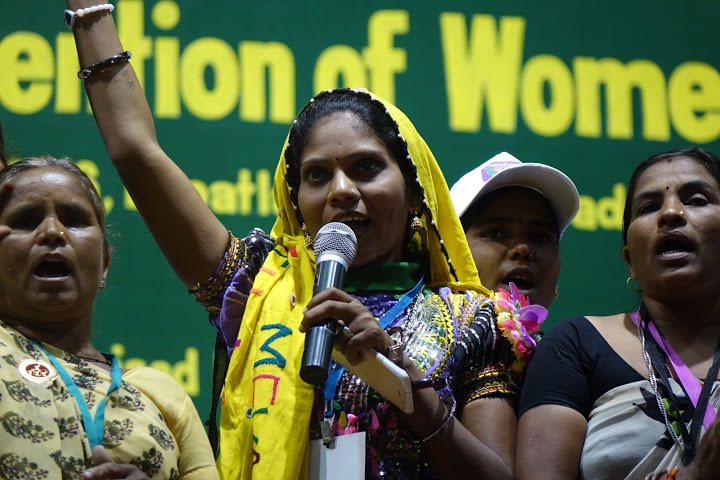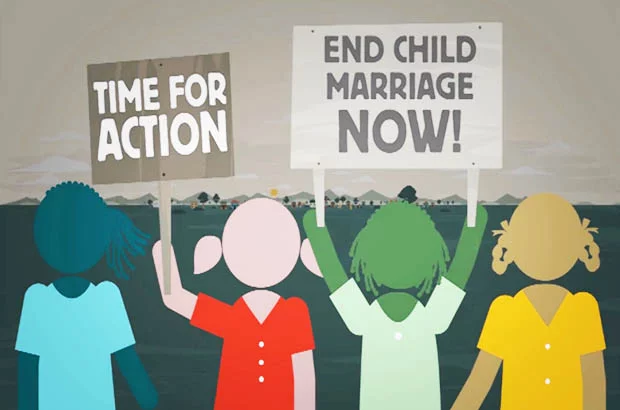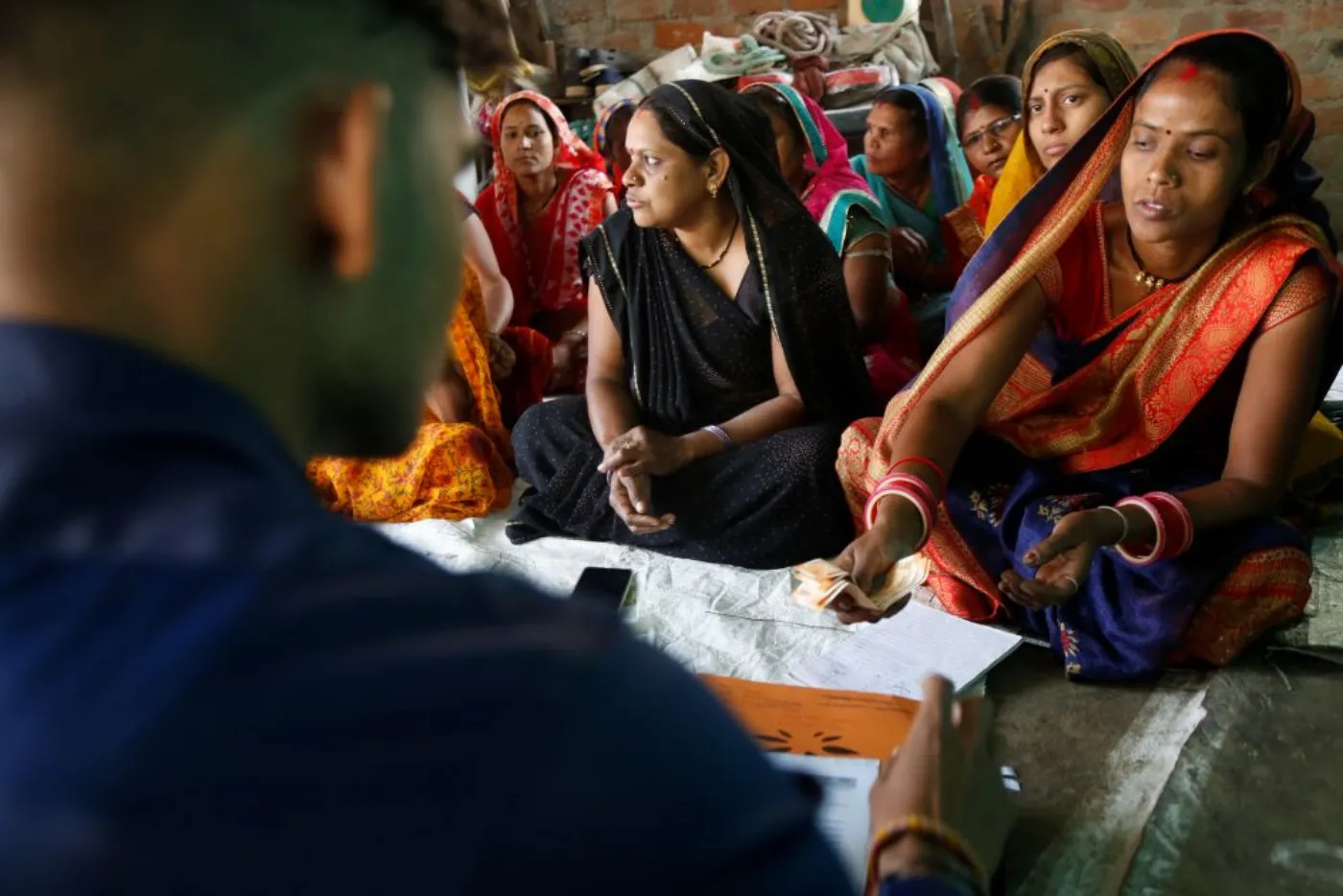Mahila Kisan Adhikaar Manch (MAKAAM), a forum for women farmers’ rights, organised a three-day National Convention of Women Farmers. MAKAAM is a collective of over 120 individuals and organisations of farming women. The convention, held from 17 to 19 March 2016 at Bapatla, Andhra Pradesh, was attended by 500 women farmers from 18 states in India. The purpose of the convention was to categorically discuss and prioritize the needs of women farmers and to make these needs visible in the national context.
Participants of the convention ratified the Bapatla Declaration, (a 28-point declaration) resolving to collectively produce sufficient grains and pulses for their own needs first and address demands within their households and communities. This would help them in creating and securing sustainable livelihoods.
We spoke to Dr. V Rukmini Rao, a social and rural development activist, and Founder-President of Gramya Resource Centre for Women (secretariat of MAKAAM), who gave us more insights into women farmers and the discussions at the convention. Here is a quick snapshot (paraphrased) of her inputs.
On Women Farmers
Women are officially unrecognised as farmers even though they do 70% of the work on every acre of land. “Unrecognized” means that they don’t get access to loans, credits, technical support, inputs and seeds and the agriculture extension workers don’t reach out to them. The system considers them invisible or non existent. They are referred to as ‘farm women’, thereby implying that men do all the work involved. Additionally, the statistics about women farmers is not recorded separately in the land revenue records as the gender is not listed next to the individual’s name. It is assumed that most farmers are men.
From a feminist perspective, we at MAKAAM demand that women farmers not only be recognized, but also have social security, income security and health care (including maternity benefits).
On Single Women Farmers
There are several single women farmers, farming on their own. Many of these women are either single, or their husbands have migrated elsewhere for work. However, due to the fact that they are not recognized, they don’t receive any support for farming.
On Women Owning Farm Lands
Traditionally, in a patriarchal society all the assets are owned by men. The same applies to agricultural land. In order to curb this inequitable and unfair distribution of land and other assets, the government must bring in a policy, that automatically includes the wife’s name along with the husband’s in the records, making all women co-owners of the land.
At the convention, we came up with another demand where we appealed to the government to distribute land to landless women, which should belong to them till perpetuity. The state should also provide support to invest in the land, improve the land and make it productive. This could easily be done using the NREGA program.
There are several women’s self-help groups in the country, and the government must facilitate them to lease land, so that women can work together to increase the productivity. Though this is already happening, the government must facilitate for this at a larger scale.
On Ecological Agriculture
The kind of agriculture that is being promoted is a big question as far as women are concerned. On one hand, large companies are coming into the space of food production, and on the other, there is no food to eat. So, we believe that sustainable agriculture needs to be promoted. For example, we should not go to an area which is dry and grow rice there, because it would deplete the ground water.
Our demand is also food-first; it is important to grow food to feed the community first. The food needs also get met when cultivation is sustainable in nature. Food productivity increases when the agriculture extension works alongside women farmers to understand their needs and requirements. When this does not happen, farmers automatically shift to other crops where subsidy is provided.
The farmers are also completely against genetically modified food. Traditionally, in our country, women have always saved the seeds and kept the seeds away for the next crop. GMO food takes away this control from women farmers.
On Forests
In forest areas, women have gendered needs – mostly women do the fuel wood and fodder collection work. Also, women are the primary users and protectors of common lands. So, women should be supported in these specific needs and this can be achieved by ensuring that any diversion of lands from commons should be considered only after the livelihood needs of the commons-dependent groups are taken into account. Traditionally, people who are native to forest areas, collect food and fodder from the forests. For example, based on a research study we did in the Rayagada district in Orissa, the community said that they get 50% of the food from the forest. But, if this access gets destroyed due to mining, they lose a huge amount of both food and fodder.
On Empowerment
We also actively work with the women farmers to understand how far along they are in the political scenario. Anandi (a non-profit organization promoting ecological agriculture and supporting tribal people) came up with a set of exercises to help women self-assess their empowerment. Women questioned and understood their influence in the political sphere – whether they have visited a gram sabha, if they have representation in the Panchayat, or if they have had the opportunity to meet an MLA.
This offered them a sense of “Who am I? Where am I? and How can I get what I want?”
The effort in MAKAAM is not just to make demands from the government, but it is to empower the women farmers so that eventually they can come forward with their own demands and make their own case.
On Violence
At the convention, we resolved to resist and challenge violence of all forms against women farmers – in fields, forests, households and workplace. Moving ahead, we also had conversations around the state violence of displacement, owing to so-called development, dams and mining.
On The Next Steps
During the convention, farmers from Andhra Pradesh put forward their demands to the Special Chief Secretary, Agriculture, who has agreed to look into the demands. We have also formed loose core groups of every state, which will collectively decide the issues and activities they want to take forward in their states.
Featured Image Credit: A moment from the National Convention Of Women Farmers | The Makaam Facebook Page
About the author(s)
Swetha is a communications professional who dabbles in several things. A feminist, she initially started writing for FII and now is an all-round writer, thinker, planner and sometimes also a designer! She tweets @swethadandapani




